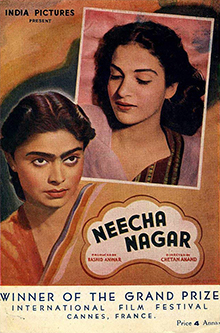Neecha Nagar
| Neecha Nagar | |
|---|---|
 Poster | |
| Directed by | Chetan Anand |
| Written by | Khwaja Ahmad Abbas |
| Story by | Hayatullah Ansari |
| Produced by | Rashid Anwar A. Halim |
| Starring | Rafiq Ahmed Uma Anand Kamini Kaushal Rafi Peer Hamid Butt Zohra Sehgal |
| Cinematography | Bidyapati Ghosh |
| Music by | Ravi Shankar |
Production company | India Pictures |
Release date |
|
Running time | 122 minutes |
| Country | India |
| Language | Hindi |
Neecha Nagar (transl. Lowly City) is a 1946 Indian Hindi-language film, directed by Chetan Anand, written by Khwaja Ahmad Abbas and Hayatullah Ansari, and produced by Rashid Anwar. It was a pioneering effort in social realism in Indian cinema and paved the way for many such parallel cinema films by other directors, many of them also written by Khwaja Ahmad Abbas. It starred Chetan Anand's wife Uma Anand, with Rafiq Ahmed, Kamini Kaushal,Murad, Rafi Peer, Hamid Butt, and Zohra Sehgal. Neecha Nagar (Lowly City) was a Hindi film adaptation in an Indian setting of Maxim Gorky's 1902 play The Lower Depths.
Neecha Nagar became the first Indian film to gain recognition at the Cannes Film Festival, after it shared the Grand Prix du Festival International du Film (Best Film) award at the first Cannes Film Festival in 1946 with eleven of the eighteen entered feature films.[2] It's the only Indian film to be ever awarded a Palme d'Or.
Overview[]
It was based on a Hindi story, Neecha Nagar, written by Hayatullah Ansari, which in turn was inspired by Russian writer Maxim Gorky’s The Lower Depths. It took an expressionist look at the gulf between the rich and poor in society.[3][4]
Neecha Nagar is the debut film of actress Kamini Kaushal and for Ravi Shankar as a music director.
Cast[]
- Rafiq Anwar as Balraj
- Uma Anand as Maya
- Kamini Kaushal as Rupa
- Murad as Hakim Yaqub Khan Sahab
- Rafi Peer as Sarkar
- S.P. Bhatia as Sagar
- Hamid Butt as Yaqoob Chacha
- Mohan Saigal as Raza
- Zohra Sehgal as Bhabi
- B. M. Vyas as Balraj's brother
Soundtrack[]
This section needs expansion. You can help by . (August 2021) |
The music of the film was composed by Ravi Shankar.
Awards[]
Citations[]
- ^ "Celebrating Zohra Segal". Google.com. 29 September 2020. Retrieved 29 September 2020.
- ^ Grand Prix du Festival International du Film (1939–54)
- ^ History will never forget Chetan Anand 13 June 2007.
- ^ Maker of innovative, meaningful movies The Hindu, 15 June 2007.
References[]
- Neecha Nagar at the New York Times
- Remembering Chetan Anand and Neecha Nagar, Hindustan Times, 29 September 2007
External links[]
- Neecha Nagar at IMDb
- Neecha Nagar on YouTube
- 1946 films
- Hindi-language films
- Indian films
- 1940s Hindi-language films
- Palme d'Or winners
- Films based on works by Maxim Gorky
- Films directed by Chetan Anand
- Social realism in film
- Films about poverty in India
- Films scored by Ravi Shankar
- Films with screenplays by Khwaja Ahmad Abbas
- Indian drama films
- 1946 drama films
- Indian black-and-white films
- Hindi-language drama films
- 1940s Hindi-language film stubs
